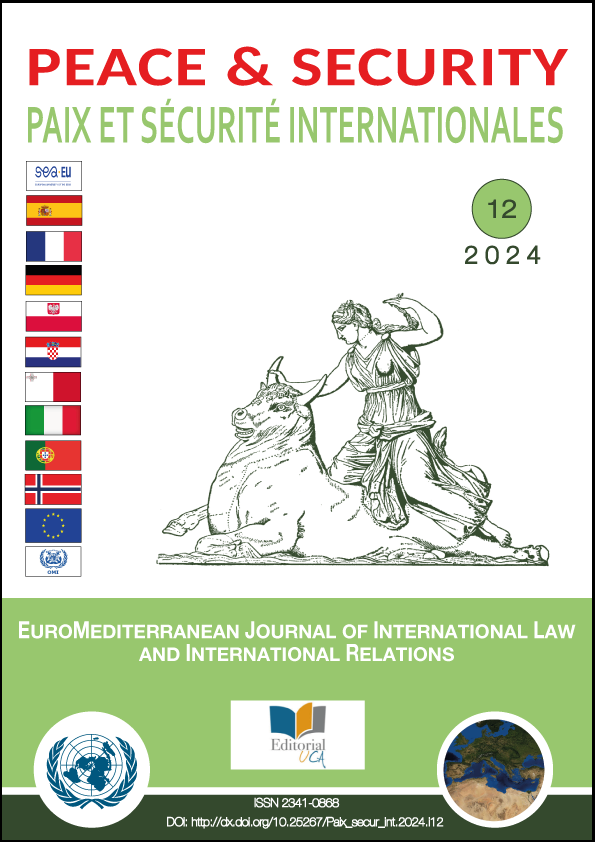Analysis and typification of the contemporary international system. An approach from structural realism and systems theories
Tribute to Professor Liñan Nogueras

DOI
https://doi.org/10.25267/Paix_secur_int.2024.i12.1801Info
Abstract
This paper analyses the evolution of the international system since the end of the Cold War. The objective is to find out whether there has been a change from a Westphalian system to a hierarchical one. To this end, we will first address the question of what an international system is and what its elements are from Waltz's structural realism. Therefore, we will focus on the structure of the system as a defining element of the system and especially on the relation of anarchy versus hierarchy and the power distribution as elements of evolution of our system. Secondly, we will use the types of action systems established by Kaplan to understand how changes in international systems operate and what are the possible configurations and determine their correspondence with the different moments of the contemporary international system.
Keywords
Downloads
How to Cite
License
Copyright (c) 2024 PEACE & SECURITY-PAIX ET SÉCURITÉ INTERNATIONALES (EuroMediterranean Journal of International Law and International Relations)

This work is licensed under a Creative Commons Attribution-NonCommercial 4.0 International License.
Copyright
Es condición para la publicación que el autor o autores ceda(n) a la Revista, en exclusiva, los derechos de reproducción. Paix et Sécurité Internationales es una revista que proporciona un acceso abierto inmediato a su contenido totalmente gratuito para lectores como para los investigadores que pretendan publicar en ella, ya que no se realizan cobros por concepto de envío, procesamiento ni publicación. Los usuarios podrán leer, descargar, copiar, distribuir, imprimir, buscar o enlazar el texto completo de los artículos publicados, o utilizarlos para cualquier otro propósito, dentro de la legalidad vigente. Y podrán hacerlo sin coste alguno, y sin necesitad de solicitar permiso al editor a al autor. Todo ello de acuerdo con la definición de acceso abierto de la Iniciativa Acceso Abierto de Budapest.
References
ALLISON, G. “The Myth of the Liberal Order: From Historical Accident to Conventional Wisdom”, Foreign Affairs, vol. 97, núm. 4, 2018.
ARON, R. Paz y guerra entre las naciones, Alianza, Madrid, 1985.
BARBÉ, E. “La crisis del orden internacional liberal y su impacto en las normas internacionales”, en: Las normas internacionales ante la crisis del orden liberal, Tecnos, 2021.
BROOKS, S. “Can we identify a benevolent hegemon?”, Cambridge Review of International Affairs, vol. 25, núm. 1, 2012.
BUZAN, B. “From International System to International Society: Structural Realism and Regime Theory Meet the English School”, International Organization, vol. 47, núm. 3, 1993.
CARDINALE, M. “Seguridad Internacional y derechos humanos: una reflexión a partir de los aportes del cosmopolitismo crítico y el liberalismo ofensivo”, Revista de Estudios en Seguridad Internacional, vol. 3, núm. 1, 2017.
CHAN, S. “Challenging the liberal order: the US hegemon as a revisionist power”, International Affairs, vol. 97, núm. 5, 2021.
GARCÍA SEGURA, C. “Westfalia, Worldfalia, Eastfalia. El impacto de las transformaciones de la estructura de poder interestatal en el orden internacional”, Revista Española de Derecho Internacional, vol. 69, núm. 2, 2017.
GILMORE, J. “Protecting the Other: Considering the process and practice of cosmopolitanism” European Journal of International Relations, vol. 20, núm. 3, 2014.
HELLQUIST, E. y PALESTINI, S. “Regional sanctions and the struggle for democracy: Introduction to the special issue”, International Political Science Review, vol. 42, núm., 4, 2021.
HOPEWELL, K. “When the Hegemon Goes Rogue: Leadership Amid the US Assault on the Liberal Trading Order”, International Affairs, vol. 97, núm. 4, 2021.
HURD, I., “Breaking and making norms: American revisionism and crises of legitimacy”, International Politics, vol. 44, núm. 2–3, 2007.
IKENBERRY, J. “Getting Hegemony Right”, The National Interest, vol. 63, 2001.
IKENBERRY, J. “The Future of the Liberal World Order: Internationalism After America”, Foreign Affairs, vol. 90, núm. 3, 2011.
JAMES E. DOUGHERTY, J. y PFALTZGRAFF, R. Teorías en pugna de las relaciones internacionales, Grupo Editor Latinoamericano, Buenos Aires, 1993.
KAPLAN, M. System and Process in International Politics, Science Editions, New York, 1962.
KISSINGER, H. Orden mundial. Editorial Debate, Barcelona, 2016.
MARRERO ROCHA, I. “A vueltas con el Estado en el análisis de las relaciones internacionales”, en Un mundo en continua mutación: desafíos desde el Derecho internacional y el Derecho de la UE: Liber Amicorum Lucía Millán Moro, Arazandi, 2022.
MEARSHEIMER, J. The Tragedy of Great Power Politics, WW Norton, New York, 2001.
MEARSHEIMER, J. “Bound to Fail: The Rise and Fall of the Liberal International Order”, International Security, vol. 43, núm. 4, 2019.
MILLER, B. “Democracy promotion: Offensive liberalism versus the rest (of IR theory)”, Millennium, vol. 38, núm. 3, 2010.
NYE, J. “Soft power: the origins and political progress of a concept”, PALGRAVE COMMUNICATIONS 3 (17008), 2018.
PAUL, T. “Globalization, deglobalization and reglobalization: adapting liberal international order”, International Affairs, vol. 97, núm. 5, 2021.
PAUL, T. y RIPSMAN, N. “Globalization and the National Security State” International Studies Review, vol. 7, núm. 2, 2010.
Ripsman, N. “Globalization, deglobalization and Great Power politics”, International Affairs, vol. 97, núm 5, September 2021, pp. 1317–1333.
ROSECRANCE, R. “Bipolarity, multipolarity, and the future”, Journal of Conflict Resolution, vol. 10, núm. 3, 1966.
SAKWA, R. “BRICS and Sovereign Internationalism”, Strategic Analysis, vol. 43, núm. 6, 2019.
SAKWA, R. “The International System and Models of Global Order”, Russia in Global Affairs, vol. 17, núm. 3, 2019.
SÁNCHEZ ORTEGA, A. “El orden liberal ante el equilibrio de poder y la redefinición de la legitimidad”, Revista Electrónica de Estudios Internacionales, vol. 43, 2022.
SHEEHAN, M. The Balance of Power: History & Theory. Routledge, 1996.
STRANGE, S. States and Markets. Bloomsbury, 2015.
TALIAFERRO, J. “Security under anarchy: Defensive Realism revisited”, International Security, vol. 25, núm. 3, 2001.
WALTZ, K. Theory of International Politics, McGraw-Hill, New York, 1979.
WATSON, A. The evolution of international society: a comparative historical analysis, Routledge, New York, 1992.






